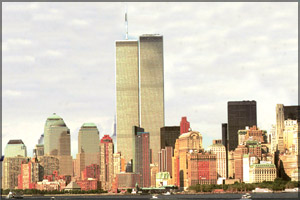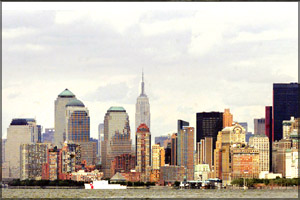Seven Years After: Nine Eleven
Priyath WIJEWARDENA
The world watched with horror live on TV the carnage at the World
Trade Center New York on eleventh September 2001. The destruction was
caused by the well known terrorist network Al-Qaeda, after meticulous
planning.
The retaliation by the U.S. was swift, with major military victories
in Afghanistan that crippled the organizations’ operational base while a
surge of support by other nations gave strength to the U.S. cause. If
the U.S. and her allies are to continue to win the War on Terror it must
be successful in the political, economical and
 |
 |
If the U.S. and her allies
are to continue to win
the War on Terror it must be successful in the political,
economical and military
dimensions. Based on this
multi dimension scale
approach there exists
a tug of war of victories between the allied nations
and the global terror
network of Al-Qaeda,
which never seems
to be fully terminated.
At the beginning the U.S. scored a range of political
and military victories. |
military dimensions. Based on this multi dimension scale
approach there exists a tug of war of victories between the allied
nations and the global terror network of Al-Qaeda, which never seems to
be fully terminated.
At the beginning the U.S. scored a range of political and military
victories. Politically the achievements ranged from enacting laws that
helped the American Government to combat terrorism internally, such as
the Patriotic Act, to obtaining unconditional support from countries,
which included states that are allied to it and even countries that are
known for anti Americanism.
Militarily the United States succeeded in removing Al-Qaeda and
Taliban from Afghanistan, thus removing Al-Qaeda’s principle operational
base, while arresting and terminating key Al-Qaeda leaders.
Economically, the U.S. has been successful in aiding Afghanistan
rebuild itself, while at the same time giving economic benefits to
Pakistan, which would become a key ally in the fight against terror.
In spite of the success that the U.S. enjoyed Al-Qaeda has also
scored numerous gains. Militarily it has succeeded in decentralizing
further its hereto loose organization, making it extremely difficult for
U.S. and Western organizations to clamp down on it.
Trailing the terrorist is further attenuated by the lack of human
intelligence within the Central Intelligence Agency of the U.S.
Politically the terrorist network has managed to make the U.S. over
extend itself and inflate it’s response to the World Trade Center
bombing.
The response of the U.S. has enabled Al-Qaeda to gain new supporters
and isolate America from its previous strong base of international
support. Al-Qaeda also has the advantage of having a support base which
can never be sidelined from it, since their antagonism with the west has
historical dimensions.
In answering the question ‘Who is winning the war on Terror?’ it must
be noted that the U.S. and present Bush administration has vital
interests in keeping Osama Bin Laden alive and maintaining the Al-Qaeda
terrorist network, which means execution of policies against the terror
network will be carried out to a certain limit.
The U.S. has scored politically due to the new doctrine of President
Bush that consists of preemptive strikes against terrorist and hostile
countries that have chemical and biological weapons.
At the same time President Bush assured the American public that
America’s number one global position is maintained. While the
President’s actions showed hostile forces that the U.S cannot be
subjugated it also gave an ultimatum to all nations to join its
coalition against Global Terror causing its allies and enemies to adhere
to the American cause.
The Bush administration did not take into account the political
nature of any regime whether democratic or dictatorial, forcing
countries even like Iran to give support to the U.S. coalition.
At the same time NATO countries declared the attack against the U.S.
to be an attack against all states in the legion and invoked Article
Number 5 of the Washington Treaty, which stipulated that ‘an armed
attack against one member to be an attack against all members.’ All
countries of the coalition offered their support. Even the erstwhile
enemy of the coalition, Russia, intensified its support.
Another political victory the U.S. scored was the additional powers
gained by the security and Presidential apparatus. The treat of sub
state actors having weapons of mass destruction allowed such laws to be
promulgated, which permitted the stringent control of people’s
movements, financial and technological transfer and foreigners use of
U.S. know how both home and abroad.
One of the laws was the Patriot Act which allowed the indefinite
detention of non citizen terrorists and the F.B.I. tapping of internet
service providers and employees. As mentioned earlier while the U.S.
scored these victories the Al-Qaeda terrorist network scored numerous
political achievements, while allowing the U.S. to make fundamental
mistakes.
The first among these was the U.S. failure to fully harness the
international support it received from its key allies and the
international community as a whole.
It did not use NATO or any other institution to fashion or implement
a response. The U.S. felt strong enough to act on its own and so it did.
By offering unconditional support the European nations were expecting to
be consulted.
The shared interests in combating terrorism and the declared
willingness of NATO to commit to such an end could have been used to
transform international institutions into an effective means of pooling
resources for a common purpose.
Thus the U.S. missed a golden opportunity. The second political
advantage that Al-Qaeda gained was the over reaction of the U.S
administration to the terrorist attack. After the September Eleven
attack the U.S. declared a ‘War on Terror.’
This is a misguided strategy as a declaration of war is usually upon
an entity than a tactic. Later the declaration was expanded to include a
‘Global War on Terror’ which is even a more nebulous term. If the
administration had declared war on Al-Qaeda and Afghanistan there might
have been some gauge for success.
Furthermore terrorist organizations want to be considered as soldiers
at war with an enemy because of the legitimizing it bestows on the
group. By declaring War on Terrorism and making Al-Qaeda the enemy
number one the U.S. administration elevated it to a status it could not
have deemed of.
The second major conflagration was the invasion of Iraq which caused
a major insurgency in the country in which local and foreign fighters
tried to oust the U.S from Iraq.
It has been argued that Iraq would be the next breeding ground for
terrorists. The U.S. carried out the invasion without the sanction of
the U.N., which together with the massive carnage taking place within
Iraq, caused international horror and portrayed America as fighting a
war against Islam.
A final political advantage that Al-Qaeda has is its strong base of
support which cannot be countered, since their support for the
organization stems from their hatred of not only U.S. policies but also
of U.S. culture and civilization. In fact Bin Laden and his followers
fall into a category called the Radical Islamists, which adopt a
puritanical disposition and an orthodox social and political operatic.
|

Before the terror attack |
|

After the terror attack |
Many of the grievances against the U.S. and the West are more
historical than contemporary. Examples of such animosity include the
historic duals in the Crusades, the memory of colonialism and the
tensions of the Cold War. Economically and militarily the U.S. achieved
some notable achievements. Militarily it destroyed Al-Qaeda base in
Afghanistan and formed a lasting but shaky friendship with the Afghan
government.
An economic achievement was reached when the international community
pledged to rebuild Afghanistan so that it would case to be a bastion of
international terrorism. The U.S. government also pledged to support
Musharaf, the former Pakistani President against radical Islamic groups
that support Bin Laden and the Taliban.
It has also rewarded him financially, politically and economically.
Militarily the U.S. has managed to arrest and kill most of the senior
and middle level officials of the Al-Qaeda organization, while those who
are still free are mostly on the run and carry out mainly survival than
attack operations.
Yet a difficulty in assessing the success of these operations is that
Al-Qaeda is a very loose organization of cells and terrorist affiliated
groups. In fact it is more of an ideology than an organization. In
response to the attack on its centralized infrastructure the movement
has decentralized even further and now consists of an eclectic range of
groups, cells, and individuals making counter terrorism extremely
difficult.
Counter intelligence is further hampered by the decline of human
means of gaining intelligence as opposed to satellite picture, which
shrank by 20 per cent in the early and mid 1990s. Most of the younger
people within the CIA left for the private sector. The agency is
therefore in critical need of an expanded corps of case officers and
analysts who can speak the Middle Eastern languages and understand the
terrorists.
The advantage that the U.S. enjoyed in removing the Taliban from
Afghanistan was only short lived as the organization has regrouped in
Pakistan. The former Pakistani President Musharaf, handled the
organization as a strategic issue and not as a danger and menace to the
Pakistani society.
The former President’s approach allowed the Taliban to flourish to a
point that it is now the biggest threat to law and order in that
country. The Taliban has managed to establish autonomous regions which
are outside the control of the federal government and has established
its stringent formula of Islam on the society that it governs.
Another edge that the Al-Qaeda has is that the network offers the
U.S. administration and the state several advantages; therefore its
destruction is never actively sought by the Bush administration. Further
the entire War on Terrorism was used as a device for Anglo American
global domination.
The U.S was the first to create the terrorist outfit known as
Mujahedin, which was later transformed into what is known as Al-Qaeda.
It was established to counter Afghan government, known as the People’s
Democratic Party of Afghanistan, which was a communist government
supported by the Soviet Union.
Osama Bin Laden and his family were deeply involved with the
Mujahedin as seen by the multi billion dollar cave construction (Tora
Bora Complex). By 1988 Bin Laden with C.I.A. approval established
Al_Qaeda out the Mujahedin, since the Mujahedin had been transformed
into an international terrorist organization with a highly sophisticated
organizational and financial apparatus.
Due to the stagnation in oil production the U.S has sought to control
the vital energy reserves. To secure this situation the U.S. needed to
expand the number of bases. New bases were sought in Middle East, South
East Europe, Latin America and South East Asia. The War on Terror was
used to implement pan America as it justified the Western Crusade for
expansions of power and profit.
The September Eleven War plans targeted key strategic areas with
energy reserves. The U.S initially had the advantage over the Al-Qaeda
organization. It had the international backing and full scope of legal
codes to mitigate the terrorist group.
Yet Al-Qaeda managed to decentralize further strengthening its
security position. The U.S. also overreacted, giving the terrorist
network more status and support. Finally the U.S. never fully wanted to
destroy the Al-Qaeda network since it had advantages in its survival.
These reasons prove that the Al-Qaeda terrorist network cannot be fully
subjugated. |

